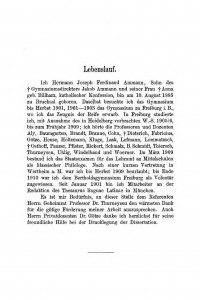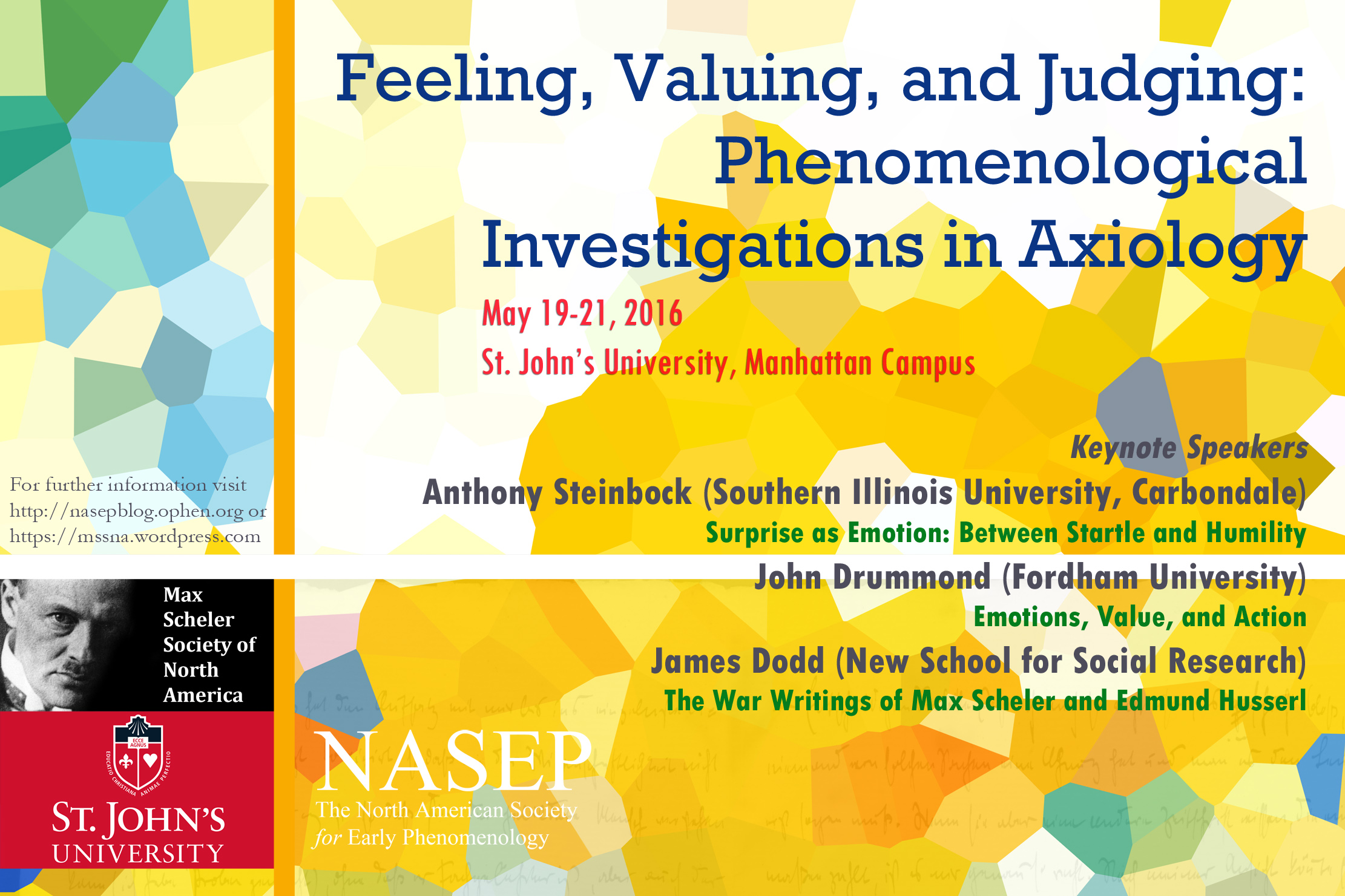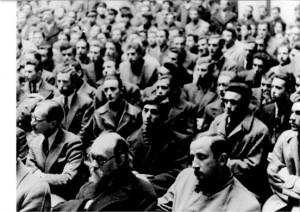With our annual conference just over a week away, we are proud to unveil the official poster for NASEP 2016 at St. John’s University! You’ll notice some faint handwriting in the bottom portion of the image. This is from a letter that the Göttingen student Rudolf Clemens sent to Max Scheler in November 1913.
Author: Rodney Parker
Hermann Ammann and the phenomenology of language
There appears to be quite little written on the relationship between the philosopher of language Hermann Ammann and phenomenology. A single letter in the Husserl Nachlass (see below) along with Ammann’s contribution to Husserl’s Festschrift indicate that he studied with Husserl at Freiburg where Ammann was a Privatdozent.
 Hermann Joseph Ferdinand Ammann was born in Bruchsal, Germany, on 10 August, 1885. In WS 1905/06, Ammann began his studies at the University of Freiburg, where – aside from a brief stay in Heidelberg – he received all of his academic training. Though his field of study was philology, Ammann studied with a number of philosophers, particularly the Neo-Kantians Jonas Cohn, Emil Lask, Heinrich Rickert, and Wilhelm Windelband. In March of 1909, Ammann completed his Staatsexamen, and in July 1910 completed his dissertation, Die Stellungstypen des lateinischen attributiven Adjektivums, under the supervision of Rudolf Thurneysen.
Hermann Joseph Ferdinand Ammann was born in Bruchsal, Germany, on 10 August, 1885. In WS 1905/06, Ammann began his studies at the University of Freiburg, where – aside from a brief stay in Heidelberg – he received all of his academic training. Though his field of study was philology, Ammann studied with a number of philosophers, particularly the Neo-Kantians Jonas Cohn, Emil Lask, Heinrich Rickert, and Wilhelm Windelband. In March of 1909, Ammann completed his Staatsexamen, and in July 1910 completed his dissertation, Die Stellungstypen des lateinischen attributiven Adjektivums, under the supervision of Rudolf Thurneysen.
After World War I, Ammann began working on his Habilitation in Comparative Linguistics with Ludwig Sütterlin in Freiburg. It is at this time – between 1919-1923 – that Ammann would have met Husserl. It was also during this time that Ammann presumably met Hendrik Pos, with whom he authored the article Zur Problematik der Sprachphilosophie (1929).
Here you can find a partial bibliography of Ammann’s works, a handful of which can be found in Husserl’s personal library.
~
Husserls Empfehlungsschreiben für Ammann, Die menschliche Rede,ca. 1924 (Abschrift)
[from HuaDok III.4: 4-5]
Das Ammann’sche kleine Buch “Die menschliche Rede” ist ein sprachphilosophisches Werk von ungewöhnlichem Reichtum und tiefem Gehalt. Ich stehe nicht an ihm eine bahnbrechende Bedeutung beizumessen. Sie beruht vor allem darauf, dass der Verfasser in einer seltenen Geistesfreiheit sich von allen Fesseln grammatischer, aber auch sprachphilosophischer Tradition frei macht und es unternimmt, eine radikale Besinnung über das Wesen der Sprache aus dem Sprachbewusstsein zu vollziehen, wie es die lebendig funktionierende Sprache begleitet, die allgemeinen und notwendigen Strukturformen der Sprache herauszustellen, ohne welche diese menschliche Funktion ihren Sinn verlöre, Sprache nicht mehr Sprache wäre. Alle sprachphilosophischen Grundbegriffe müssen diesen lebensvoll erfassten Phänomenen direkt und vorurteilsfrei angepasst werden und dienen dann als Normen für die Interpretation der grammatischen Phänomene und die Kritik traditioneller grammatischer und sprachphilosophischer Theorien. So entwirft Ammann in echt phänomenologischem Geiste den Grundansatz und die prinzipiellen Richtungslinien sprachphilosophischer Forschung – wobei aber zu bemerken ist, dass er sich auch von einer schulmässigen Anlehnung an die phänomenologische Richtung fernhält und alles was er sagt aus selbst Erarbeitetem schöpft. Bedeutend wie der Problemansatz ist auch die Ausführung. Sie überrascht immer wieder durch ihre echte Originalität, die nicht mit geistreichen Einfällen spielt, sondern aus der Fülle sprachlichen Lebens Einsichten schöpft. Kapitel für Kapitel stossen wir auf sorgfältige und bleibend wertvolle Analysen, lessen sehr Förderliches und oft Erleuchtendes über das Wesen der Bedeutung in ihren verschiedenen Formen, über Namen und Identität, über das Verhältnis von Idee zu Begriff und zu anschaulicher Vorstellung, über das Problem des Verbums (Bedeutung als Lebensgehalt und Erlebniswert). Sehr originell ist zum Schluss die Auffassung des Eigenschaftswortes (Adjektivs bezw. Adverbs) als eine mit Nomen und Verbum gleichbedeutende Grundkategorie (“Eindruckswort”).
Alles in allem: es ist ein erster entscheidender Anfang einer phänomenologisch orientierten Wesenserforschung der Sprache, der gerade dadurch bleibend bedeutsam ist, dass der Verfasser die konkreten Bedürfnisse prinzipieller Klärung zu befriedigen sucht, die ihn als Sprachforscher bewegen.
Call for Applications: Venice Summer School in Phenomenology
Call For Applications
DEPARTMENT OF PHILOSOPHY AND CULTURAL HERITAGE
CA’ FOSCARI UNIVERSITY VENICE
SUMMER SCHOOL OF PHENOMENOLOGY AND
PHENOMENOLOGICAL PHILOSOPHY
The 2016 edition of the Summer School will take place in Venice on July 12-15. The theme will be:
Phenomenology and History
It has been a long time since one could legitimately ask the question of how an apparently a-historical philosophical discipline, such as phenomenology, the eidetic science of transcendental consciousness, could entertain a vital relation with the reflection on the factual and mundane dimension of history and, at a more fundamental level, with the notion of historicity. A vast number of Husserl’s writings published over the last decades, and revolving around themes such as the different levels of communal life, the distinction between “nature” and “spirit” and the methodological status of the corresponding sciences, the genetic dimension of constitution, and, finally, the rootedness of all sciences the life-word have made it impossible to see a principled opposition between the systematic recourse to the eidetic method on the one hand, and the recognition of the centrality of the historical dimension, on the other. At the same time, number of original post-war theoretical developments (chiefly those of Heidegger, Sartre, Patočka, Arendt, and Gadamer) have stressed the connection between phenomenology and historicity even more markedly. It has now appeared that, in virtue of the way in which it cuts across the most significant philosophical issues explored by the tradition loosely called “phenomenological” (the nature of rationality, the “history of being”, the role of philosophy in Western culture, the philosopher’s self-understanding as moment of a historical development, etc.), the theme of history is perhaps the most appropriate for a critical confrontation of the different authors belonging to it, as well as for an assessment of the relation between phenomenology and the other most important currents of contemporary philosophy. Moreover, somehow paradoxically, it has become increasingly the case that those who are persuaded that an authentic philosophical interest cannot be pursued without explicitly making thematic the historical dimension of humane existence and the problematic relation that thought entertains with its own historicity, turn to the phenomenological tradition precisely because of its ability to address these issues in a radical way.
The seminars of the Summer School will address different aspects of this broad theme. No previous background in phenomenology is required. On the final day of the seminar, advanced students will be encouraged to give a personal contribution to the School’s activities.
Language: English
Seminars will be led by:
Daniele de Santis (Seattle University)
Nicolas de Warren (Husserl Archives at KU Leuven)
Matteo Giannasi (Ca’ Foscari University Venice)
Burt Hopkins (Seattle University)
Arun Iyer (Seattle University)
Niall Kean (University of Limerick)
Hélène Leblanc (University of Geneva)
Claudio Majolino (University of Lille)
Darian Meacham (University of the West of England)
Dermot Moran (University College Dublin)
Gianluigi Paltrinieri (Ca’ Foscari University Venice)
Emiliano Trizio (Seattle University)
Applicants should send a CV and a sample of writing (optional) to
phenomenologysummerschool@gmail.com
The number of attendants being limited.
Deadline for submission: May 10, 2016
Notification of acceptance: May 12, 2016
The event is organized and sponsored by the Department of Philosophy and Cultural Heritage of Ca’ Foscari University Venice.
PARTICIPATION FEE: 100 euro (50 euro for Ca’ Foscari students and previous attendants)
Titles and abstracts of the seminars, details about the exact location within the city of Venice, as well information about travel and accommodation will be made available soon. The participation fee does not cover any expenses for travel, food, and lodging.
Women Phenomenologists on Social Ontology special promotion
In association with the upcoming international conference, “Women Phenomenologists on Social Ontology,” February 11th-12th, 2016 Paderborn University, Germany, Routledge is offering a special promotion on a number of titles in phenomenology. Please follow the link below to see the complete list of books, as well as the promotional code that will get you 20% off the list price.
https://www.routledge.com/philosophy/posts/9327
Extended Deadline: NYPPP 2016 – Phenomenology of Emotions
The New Yearbook for Phenomenology and Phenomenological Philosophy (2016) Invites submissions on the following topic:
Phenomenology of Emotions: Systematic and Historical Perspectives
Guest Editors:
Ignacio Quepons (Seattle University)
Rodney K.B. Parker (Western University)
The emotions (Gefühlen, Stimmungen) have been a topic of phenomenological analysis since the beginning of the phenomenological movement. In recent years there has been a general turn toward a serious reconsideration of emotional experience in philosophy and in the social and cognitive sciences. This has led to an increased interest in the phenomenological descriptions of emotion developed by Edmund Husserl and his early followers, and how their work might shed light on current problems and debates.
We welcome submissions on systematic and historical aspects of the phenomenology of emotions, with emphasis on Husserl and the early reception of his work on emotion; current developments in phenomenology of emotions; valuing and action in phenomenology; and historically informed discussions of the problem of the intentionality of emotions, moods, or feelings within phenomenological research. The writings of Franz Brentano, Edmund Husserl, Carl Stumpf, Theodor Lipps, Moritz Geiger, Alexander Pfänder, Max Scheler, Maximilian Beck, Else Voigtländer, Margarete Calinich, Aurel Kolnai, and Stephan Strasser, among others, are of particular interest. We are open to receive contributions on the topic of intentionality of emotions in other philosophical traditions if the paper emphasizes, compares or criticizes an important aspect of the phenomenological account of emotions.
Articles can be no longer than 75.000 characters, including spaces and footnotes. All submissions should be prepared for blind review, and sent to queponsi@seattleu.edu or iquepons@gmail.com no later than the extended deadline of 5 February, 2016.
Confirmed invited contributors:
Anthony Steinbock (Southern Illinois University Carbondale)
Antonio Zirión Q. (National and Autonomous University of Mexico)
Ingrid Vendrell Ferran (University of Marburg)
Mariano Crespo (University of Navarra)
John Drummond (Fordham University)
Panos Theodorou (University of Crete)
Please circulate the following .pdf widely: NYPPP 2016 call for papers
CFP – Discipline Filosofiche XXVI, 1, 2016. Phenomenological Ontologies
Call for Papers
Thematic Issue Of Discipline Filosofiche XXVI, 1, 2016. Phenomenological Ontologies: Individuality, Essence, Idea.
Volume Editors: Simona Bertolini And Faustino Fabbianelli
Thematic Issue of Discipline Filosofiche XXVI, 1, 2016: Phenomenological Ontologies: Individuality, Essence, Idea. Volume Editors: Simona Bertolini and Faustino Fabbianelli
Husserl’s interest in the concepts of eidos and essence marked the beginning of the phenomenological debate about how to define and distinguish them. In the twenty years following the publication of Jean Hering’s “Bemerkungen über das Wesen, die Wesenheit und die Idee” (1921), several attempts have been made to examine the structure of essence and idea, with respect to their relation to individual objects. In the works of Roman Ingarden and Herbert Spiegelberg, and even in those of more independent phenomenologists like Edith Stein and Nicolai Hartmann, these concepts were the primary subject of systematic investigation ranging from the self-foundation of eidetic science (as in Ingarden’s ontological project) to Stein’s reinterpretation of Thomistic metaphysics. The phenomenological model offers a ground for the development of a variety of ontologies that, despite differences in their methodological assumptions, share a common focus on the objectual conditions of eidetic vision, thus expanding the thematic field of phenomenology and connecting it with the age-old questions of traditional metaphysics. The reality of individual objects, whether “bracketed” or not, is considered by the cited philosophers as the base of an ontological structure that has the multiplicity of essences and the ideal dimension as determining moments. The aim of our issue is to explore this field of discussion developed within the phenomenological tradition after the publication of Hering’s essay. Among the topics we invite authors to consider:
1) the definitions of and distinctions between the concepts of idea and essence;
2) the different methodological contexts and possible meanings of the phenomenological ontology underlying such a discussion;
3) comparisons to past metaphysics (Plato, Aristotle, Thomas Aquinas, Duns Scotus, etc.).
Submission guidelines: Submission can be made in English, Italian, French, and German and should not exceed 9,000 words including abstract, references and footnotes. Manuscripts are welcome in English, Italian, German or French. They should be prepared for anonymous refereeing and sent by email attachment in Microsoft Word together with a .pdf version to Simona Bertolinibertolini1980@gmail.com. Contributions are sent to two independent reviewers in a double-blind procedure prior to the publication decision. Authors may be requested to change or improve their articles when suggested by reviewers. Please attach both a fully blinded version of your paper as a “Manuscript” and a separate “Cover page” indicating full name of the authors, academic title, university affiliation and full contact details. The submission should contain an abstract in English, not exceeding 150 words. For further details, please see guidelines (all submissions will be acknowledged). Submitted manuscripts can be formatted in any clear and consistent style, but authors finalizing their papers for publication will be required to hand in a final version that respects the journal’s stylistic rules (download Style guidelines).Submission of a manuscript is understood to imply that the paper has not been published before and is not being considered for publication by any other journal. The publication of the papers implies that authors waive the copyright; they could request the copyright to the journal for future publication of them.
Deadline for submission: February 28, 2016.
Notification of acceptance, conditional acceptance, rejection: April 15, 2016.
Final version due: May 31, 2016.
Reading Room Update – Migration plans and Ernst von Aster
NASEP is pleased to announce that we are now beginning to migrate the contents of our Reading Room to the Open Commons of Phenomenology platform (along with the NASEP blog itself). We want to thank all of our users for supporting and promoting the contents of our Reading Room, and we look forward to expanding our collection during the migration process.
As we make our move, we will be updating you on new additions to the Reading Room as we have in the past. We apologize that new material has been slow to appear over the past few months.
The first set of writings to move over to the OPhen platform are those of Ernst von Aster. More items will be added to von Aster’s bibliography as we receive them.
Ernst von Aster was born in Berlin on 18 February 1880. In the summer semester of 1898, von Aster began his university education in Berlin studying mathematics, natural science, and philosophy. He later moved to the University of Munich where he studied under Hans Cornelius and Theodor Lipps, and was an active member of the Psychologische Verein. He completed his dissertation with Lipps on 25 May 1902. The dissertation, Über Aufgabe und Methode in den Beweisen der Analogien der Erfahrung in Kants Kritik der reinen Vernunft, was published in the Archiv für Geschichte der Philosophie in 1903. Von Aster remained in Munich to write his Habilitation thesis, Untersuchungen über den logischen Gehalt des Kausalgesetzes, which he completed on 24 July, 1905.
In the summer semester of 1906, von Aster began teaching at the rank of Privatdozent in Munich (his first courses were Grundzüge der Ethik and Über Wesen und Aufgabe des psychologischen Experiments und der psychologischen Beobachtung). Sometime in August 1912, he was promoted to the rank of Associate Professor of Philosophy (though the university course calendar does not reflect this change in status until summer semester 1913). He remained in Munich until WS 1920/21, at which point he became the successor of Hermann Siebeck as the chair of Philosophy and Pedagogy at the University of Giessen.
After the National Socialist party came to power in 1933, von Aster lost his chair at Giessen for being a Social Democrat, and fled to Sweden. In 1936, von Aster was appointed full Professor at the University of Istanbul. Edmund Husserl wrote a letter of recommendation on his behalf. Von Aster died in Stockholm on 22 October, 1948.
For more information on Ernst von Aster, see:
- Hans Michael Baumgartner. 1981. Unbeirrbarkeit und Würde der Philosophie. Zum Gedächtnis des 100. Geburtstages von Ernst von Aster. Zeitschrift für philosophische Forschung 35:2, 259-263.
- Regine Mader. 1981. Bibliographie Ernst von Aster (1880-1948). Zeitschrift für philosophische Forschung 35:2, 263-267


